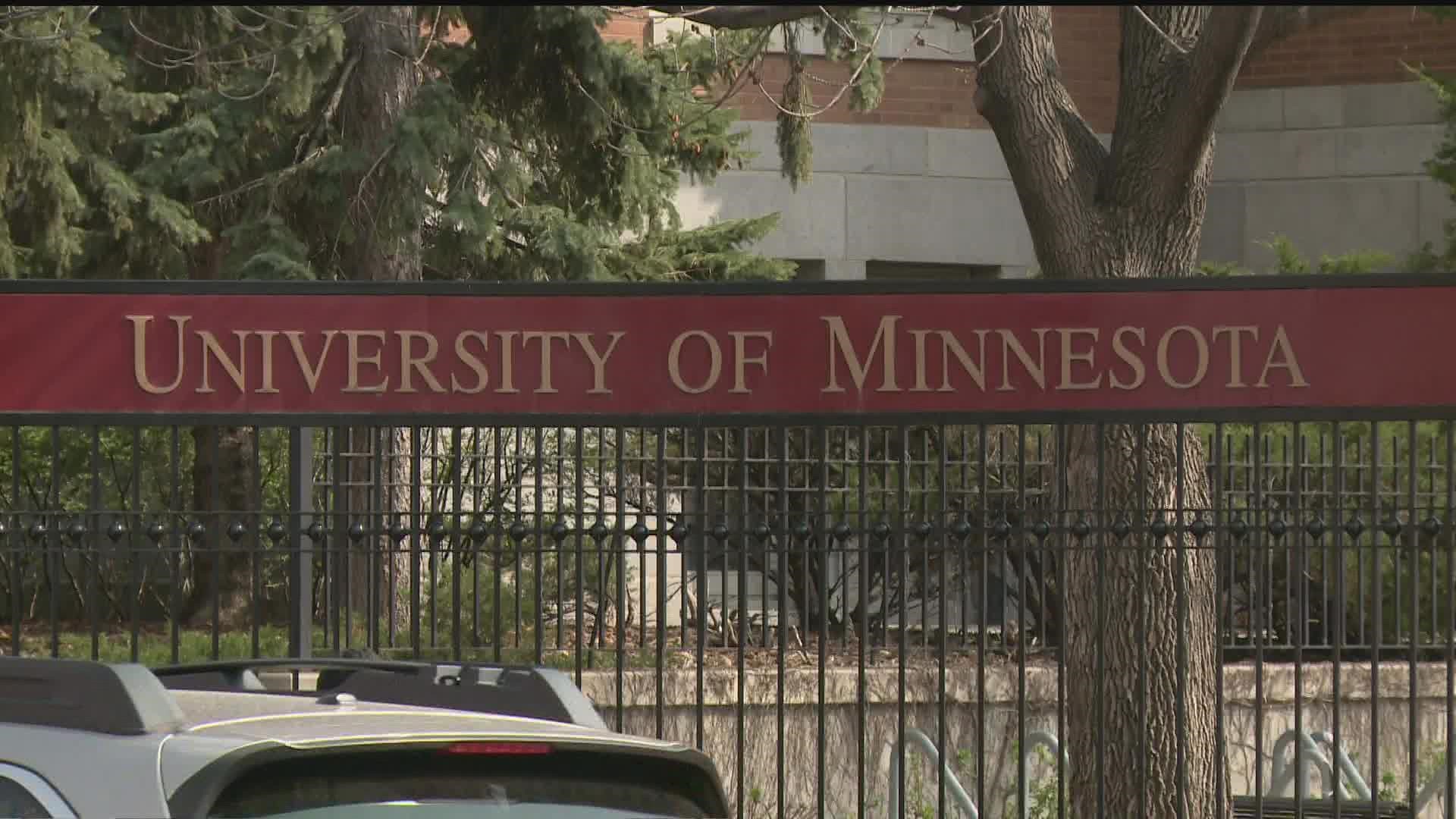MINNEAPOLIS — University of Minnesota President Joan Gabel's proposed fiscal year 2023 budget calls for a tuition increase across all campuses, including a 3.5-percent hike for undergraduates in the Twin Cities, subject to approval by the Board of Regents next month.
Gabel released her proposal on Friday, saying in a statement that the budget "achieves strategic goals and advances the University's excellence in the face of rising costs." Along with the proposed 3.5-percent increase on the Twin Cities and Rochester campuses, the president is asking the Board of Regents for a 1.75-percent increase on the Duluth, Morris and Crookston campuses.
In addition to asking for tuition increases, Gabel also aims to free up as much as $28 million through "internal reallocations" and reductions in spending, while at the same time offering merit-based pay increases to employees.
"This budget invests in supporting and building world-class staff, incorporating a responsible tuition and fee plan and challenging all units within the University to continuously prioritize and improve efficiency," Gabel said.
However, news of a potential tuition hike did not sit well on campus in the Twin Cities, where students are already dealing with a 1.5-percent increase in the 2021-22 school year.
If the Board of Regents were to approve Gabel's budget, an in-state undergraduate student on the Twin Cities campus would pay an extra $474 next year, while out-of-state students would pay another $1,124, bringing in-state and out-of-state tuition to $14,006 and $33,246, respectively.
"I think it's kind of ridiculous," sophomore Adrika Dasgupta said. "I feel like affordable education is really important for everyone, for people's futures and to achieve people's goals. I think raising tuition, when it's already so high, is not really cool."
Mya Tines, also a second-year student from Rochester, said the proposal comes at a time when undergraduates are already struggling with higher rents and fallout from inflation.
"The university has money to spend, and they could be giving it back to students in the form of lower tuition," Tines said. "Student loans have been paused for right now. So, I think it's crazy they are raising it even more. They know people can't pay it."
Tines also criticized President Gabel for proposing tuition increases after the Board of Regents approved a salary increase for her last year, although the board argued it would bring her closer in line to peer Big Ten institutions.
"I think that's a little iffy," Tines said.
However, in the 389-page budget proposal document, the university pointed out that the proposed tuition increases would continue "the commitment to hold tuition rate increases below the inflation rate, even in an environment of flat state support and potentially significant cost increases associated with inflation."
Mark Kantrowitz, a renowned higher education expert who has written extensively on the topic of college costs and financial aid, said the University of Minnesota's proposal "sounds like a reasonable increase."
"Trying to balance competing objectives of having enough money to pay faculty and staff and cover their expenses, with the recognition that students and their families are still struggling during the pandemic," Kantrowitz said. "Colleges are feeling a lot of pressure right now, but they're trying to keep the tuition increases under control."
According to Kantrowitz, the pandemic decimated the budgets of many four-year universities, particularly those who saw a steep decline in enrollment.
"The typical pattern that we see, during an economic downturn, or towards the end of an economic downturn, we start seeing above-average tuition increases, and that continues for a few years afterward," Kantrowitz said. "Because state appropriations may be down, tuition revenue is the one form of revenue that colleges usually have some degree of control over."
From 2008-09 to 2010-11, for example, in-state undergraduate tuition increased more than 7 percent each year on the University of Minnesota's Twin Cities campus. The school froze tuition in 2013-14 and 2014-15, as well as during the first year of the pandemic in 2020-21.
With a tuition increase again on the table for 2022-23, President Gabel's budget document also argues that increased federal and state grant programs "will provide an offset to the recommended tuition increases for students eligible for those grants." Furthermore, the university's Promise scholarship is expected to reach as many as 15,000 low-income and middle-income students next year.
Even so, students are urging the university to reconsider the proposed tuition increases.
"Just to think about the students who maybe aren't in a place to be eligible for financial aid," Adrika Dasgupta said, "but also aren't able to really comfortably pay those higher tuitions. It puts them in a really tricky spot."
The Board of Regents will review the proposed budget in a public discussion this Thursday, ahead of a public forum on Friday morning. A vote is expected in June.
In a statement, Board Chair Ken Powell said "as a Board, we appreciate how much thought and effort goes into building a proposed operating budget in these circumstances. We will continue to make decisions in this uncertain environment that best position the University for long-term success.”
Meanwhile, Regent Darrin Rosha shared concerns about the proposed tuition increase in a phone interview with KARE 11, saying the university's prices have grown out of line with peer institutions in recent years.
"When you're in a deep hole, you stop digging. We are already far higher in the price of tuition than our neighboring institutions," Rosha said. "Any increase at this point just takes us even more in that direction, and that's not helpful, especially when you look at it in the context of some substantial administrative compensation increases that have been passed recently by this board. I think the people of the state and the legislature ought to be paying attention."
Watch more local news:
Watch the latest local news from the Twin Cities in our YouTube playlist:

